My grandparents lived on a coffee estate that was situated in the middle of nowhere. Long stretches of very straight, un-tarred roads connected them to the nearest –very –small town. Neighbours lived miles away and a trip to the Planters’ Club was a real treat. Returning late at night from rare visits, everything seemed so remote, the surroundings so empty, the darkness so complete, that our car was like a little speck, travelling through space. This is where my grandparents retired to from the Andaman Islands, bringing with them the most extraordinary memories, stories and all kinds of strange and exotic objects from their earlier lives. The estate and house once belonged to an Englishman named Crawford, whose spirit refused to return to its home across the seas and lingered, instead, in this secluded house in Southern India. There were antique flintlock guns and other curiosities that were mounted on the walls of an enclosed verandah that became a part of my grandparents’ new home, and his story often mingled with theirs. 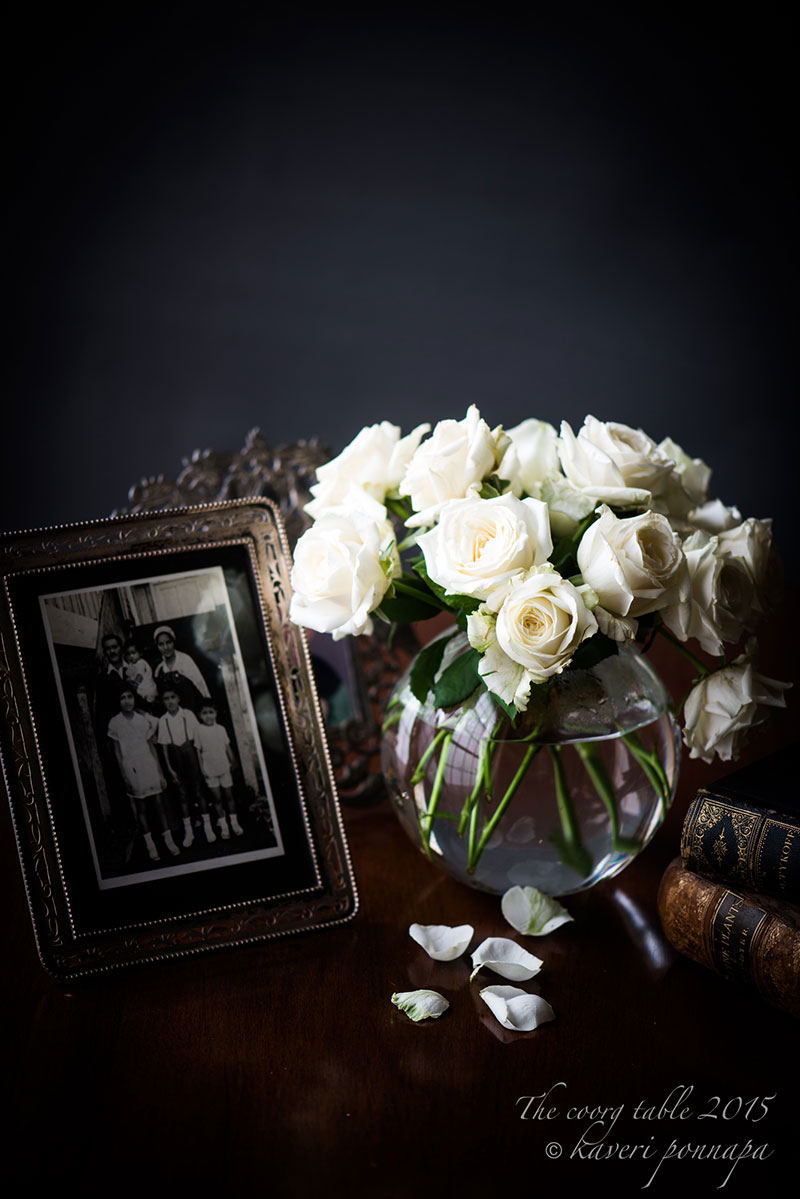
The house was already mellow when they acquired it, long and low, with a large tamarind tree in front, window boxes of geraniums and a tangle of garden; an old mango grove sprawled to one side. Later, fields of maize were planted in an empty patch, supplying us with fresh corn on the cob with melted butter. A stony drive curved up to the porch, bringing occasional visitors, shaking the old house out of its routine, and then curved swiftly out in the opposite direction, taking them back to the wooden gate where a towering clump of bamboos whispered and rustled endlessly, leaving the house to settle back into its quiet ways. 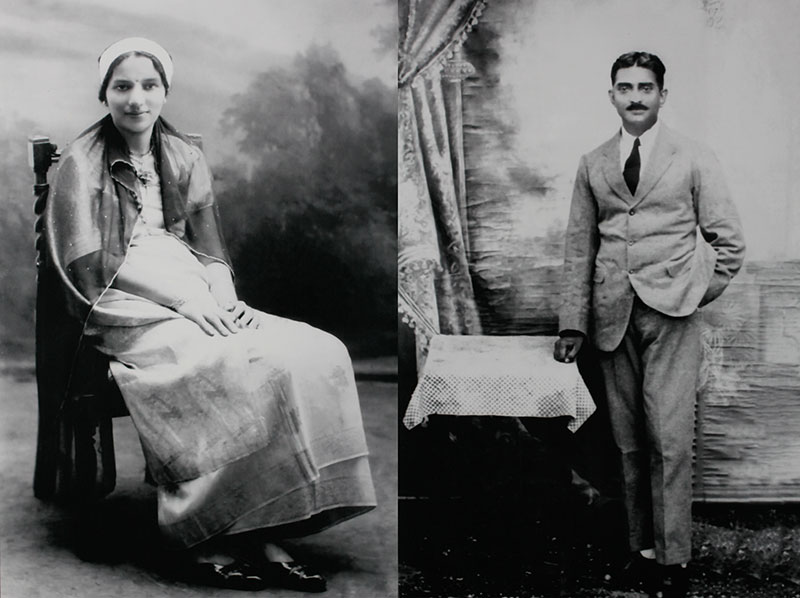 If you walked around the back, past the cowsheds and chicken coops to one side, you could climb over a stile across a barbed wire fence into the filtered half-light that came down through the trees into the coffee estate. It was a strange underwater world of light and shade, and this is where grandfather was happiest. An austere, hardworking man, the forest was his world; his working plans for the Andaman forests made him a legend in his own time, but what I cherished, personally, was his article on the Shom Pen tribe, written after an official expedition to the Nicobar Islands that read like a classic, early anthropological report. There was, however, another, very different world he had created and loved, a complete contrast to the wilderness he lived close to, most of his life. He had exquisite taste, and the house was studded with a lifetime’s collection of woodcarvings, chandeliers, elegant, polished furniture, carved Chinese camphor chests, china, glass and scores of shells and corals, glimpses of another, very different time.
If you walked around the back, past the cowsheds and chicken coops to one side, you could climb over a stile across a barbed wire fence into the filtered half-light that came down through the trees into the coffee estate. It was a strange underwater world of light and shade, and this is where grandfather was happiest. An austere, hardworking man, the forest was his world; his working plans for the Andaman forests made him a legend in his own time, but what I cherished, personally, was his article on the Shom Pen tribe, written after an official expedition to the Nicobar Islands that read like a classic, early anthropological report. There was, however, another, very different world he had created and loved, a complete contrast to the wilderness he lived close to, most of his life. He had exquisite taste, and the house was studded with a lifetime’s collection of woodcarvings, chandeliers, elegant, polished furniture, carved Chinese camphor chests, china, glass and scores of shells and corals, glimpses of another, very different time. 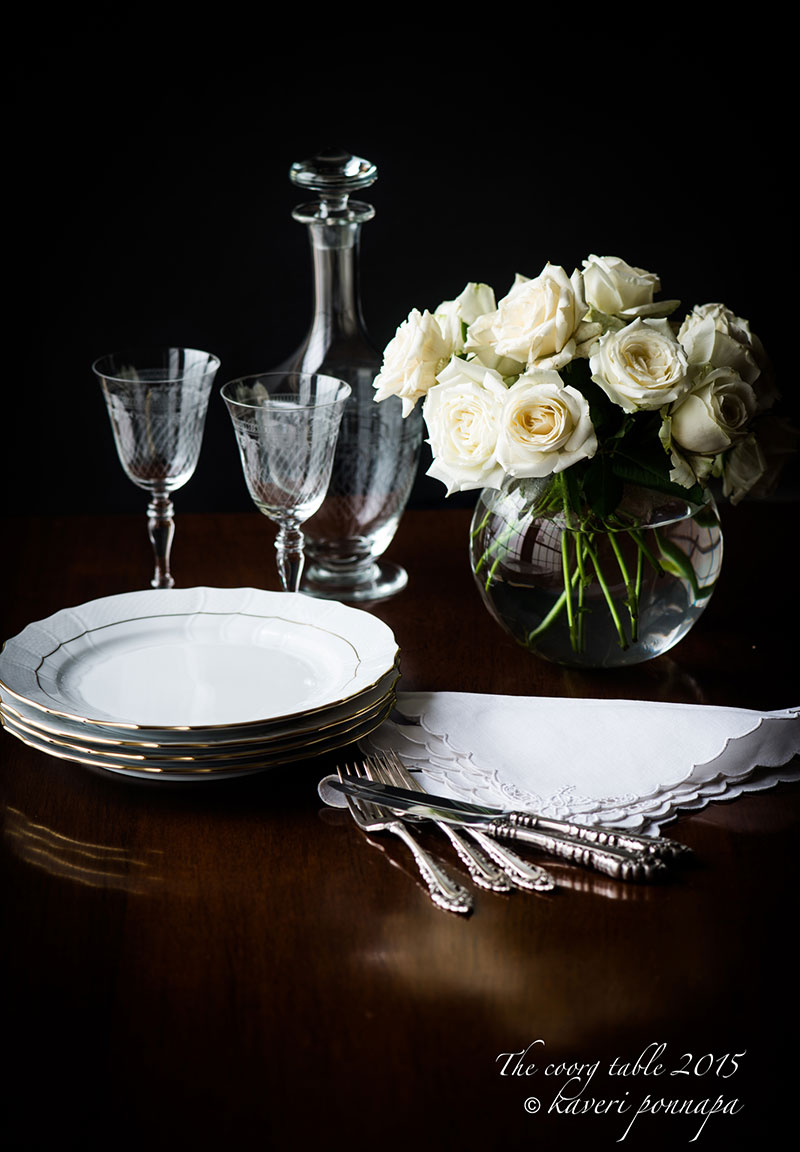 The house was old, with creaky floorboards and dark paneling on the walls in places. It was a place of imagination, charm and haunting presences, the perfect backdrop for my grandparents’ unusual lives and the stories that seemed to follow them everywhere. Its spaces encouraged daydreams. The old house divided time within itself, taking on one character during the day, and an entirely different one when night fell. During the day, sunlight beamed in through skylights in the tiles, lighting up the beautiful, polished furniture, bookshelves and pictures, the cotton fabrics that dressed the beds and chairs and the pretty tea table decorated with flowers that was set out every afternoon. At night, the whole world changed. For the first few years, there was no electricity, and every evening grandfather oversaw the small ceremony of trimming wicks and filling kerosene into brass lamps with glass chimneys. The lamplight was low and warm. It glinted off beautiful old chandeliers, splintering into layers of colour. It threw deep shadows that wavered, advanced and withdrew. Sometimes it whispered stories. In the shadows, the Indonesian woodcarvings and fierce Yalis with protruding tongues and bulging eyes became more than artifacts –they became entire worlds, dark and strange, and made us think of lives lived on a cluster of islands covered in dense tropical jungle in the Bay of Bengal. Darkness lay thick around the house at night, and suddenly, the tales my grandmother told us were everywhere: they hid in crevices, and leapt out from deep, dark wooden wardrobes. Stories of hostile Jarawa tribesmen, and friendly Great Andamanese; of fishing and swimming in the open seas, and hunting giant turtles in an outrigger with the chief of the Great Andamanese; of expeditions that grandfather went out on, to chart islands, and ghosts of Japanese soldiers, left behind on the islands after the Second World War. On grandfather’s desk was a paper cutter made from a Jarawa arrowhead: it had been shot into one of their party while they were patrolling the jungles.
The house was old, with creaky floorboards and dark paneling on the walls in places. It was a place of imagination, charm and haunting presences, the perfect backdrop for my grandparents’ unusual lives and the stories that seemed to follow them everywhere. Its spaces encouraged daydreams. The old house divided time within itself, taking on one character during the day, and an entirely different one when night fell. During the day, sunlight beamed in through skylights in the tiles, lighting up the beautiful, polished furniture, bookshelves and pictures, the cotton fabrics that dressed the beds and chairs and the pretty tea table decorated with flowers that was set out every afternoon. At night, the whole world changed. For the first few years, there was no electricity, and every evening grandfather oversaw the small ceremony of trimming wicks and filling kerosene into brass lamps with glass chimneys. The lamplight was low and warm. It glinted off beautiful old chandeliers, splintering into layers of colour. It threw deep shadows that wavered, advanced and withdrew. Sometimes it whispered stories. In the shadows, the Indonesian woodcarvings and fierce Yalis with protruding tongues and bulging eyes became more than artifacts –they became entire worlds, dark and strange, and made us think of lives lived on a cluster of islands covered in dense tropical jungle in the Bay of Bengal. Darkness lay thick around the house at night, and suddenly, the tales my grandmother told us were everywhere: they hid in crevices, and leapt out from deep, dark wooden wardrobes. Stories of hostile Jarawa tribesmen, and friendly Great Andamanese; of fishing and swimming in the open seas, and hunting giant turtles in an outrigger with the chief of the Great Andamanese; of expeditions that grandfather went out on, to chart islands, and ghosts of Japanese soldiers, left behind on the islands after the Second World War. On grandfather’s desk was a paper cutter made from a Jarawa arrowhead: it had been shot into one of their party while they were patrolling the jungles. 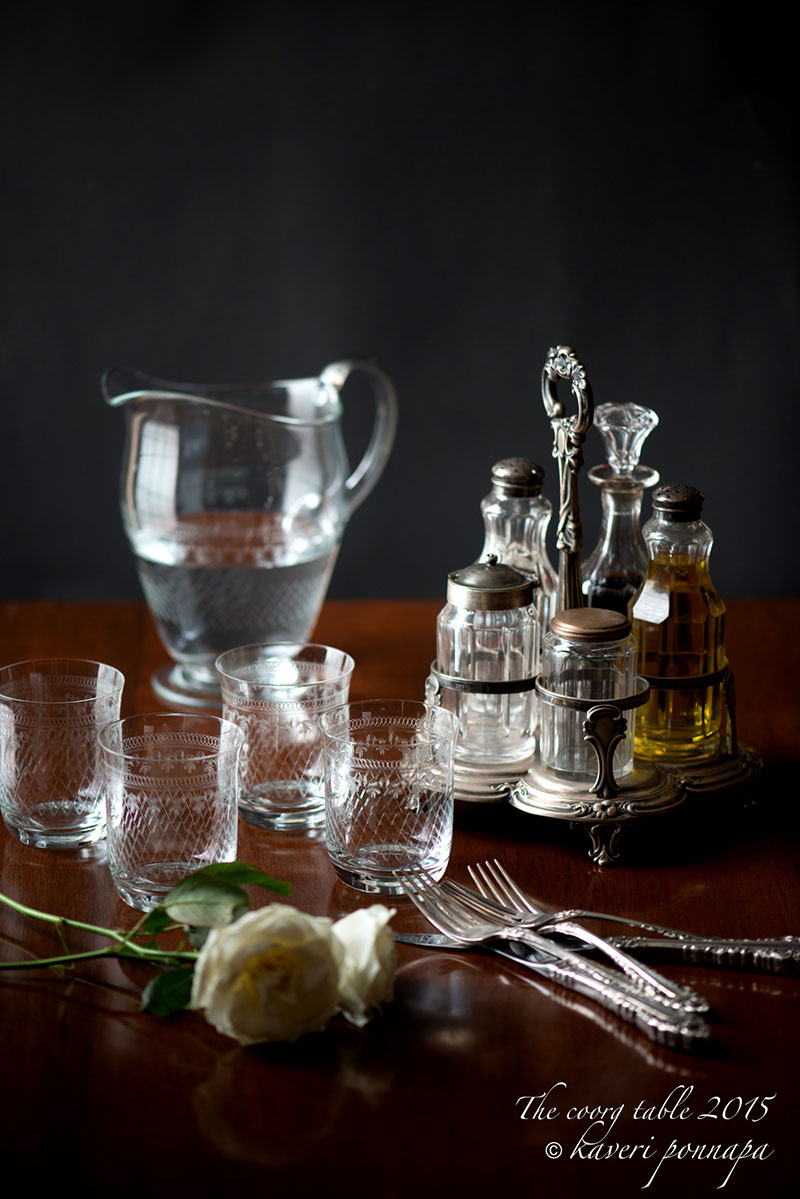 We dined every day at a vast, dark, glowing table crafted from Andaman wood. Benjarong soup bowls in jeweled colours with matching lids lined a deep, recessed shelf, along with English china and coloured glasses. Ivy patterned Noritake turned up on special occasions. For grandmother, who married at 16, and left Coorg to live in the Andamans, every day was a celebration. She had the gift of turning ordinary occasions into an event. I never saw her cook, except for stirring an occasional pot, or hovering over a tray of coconut toffee, but she certainly knew how food was supposed to taste, and look, on the table. She used the prettiest china and flatware as well-designed props on a stage set, so that every meal had the suggestion of extravagance and drama. The alcoholic, temperamental cook managed to turn out the most delicious meals under grandmother’s supervision. She loved lively company, was as loquacious as grandfather was silent. She also had a knack for managing people. Colourful characters, convicts from the infamous Cellular Jail at Port Blair, staffed her entire household in the Andamans. One of my favourite stories was of how she once had a Burmese cook who had previously been a river pirate on the Irrawaddy –his job was to carry the kerosene, douse a ship that had been attacked and looted, and set it ablaze. Grandmother certainly had a generous helping of the Coorg spirit and nerves of steel to help her along, and soon became one of the most sought after hostesses, known for her excellent table and lively parties.
We dined every day at a vast, dark, glowing table crafted from Andaman wood. Benjarong soup bowls in jeweled colours with matching lids lined a deep, recessed shelf, along with English china and coloured glasses. Ivy patterned Noritake turned up on special occasions. For grandmother, who married at 16, and left Coorg to live in the Andamans, every day was a celebration. She had the gift of turning ordinary occasions into an event. I never saw her cook, except for stirring an occasional pot, or hovering over a tray of coconut toffee, but she certainly knew how food was supposed to taste, and look, on the table. She used the prettiest china and flatware as well-designed props on a stage set, so that every meal had the suggestion of extravagance and drama. The alcoholic, temperamental cook managed to turn out the most delicious meals under grandmother’s supervision. She loved lively company, was as loquacious as grandfather was silent. She also had a knack for managing people. Colourful characters, convicts from the infamous Cellular Jail at Port Blair, staffed her entire household in the Andamans. One of my favourite stories was of how she once had a Burmese cook who had previously been a river pirate on the Irrawaddy –his job was to carry the kerosene, douse a ship that had been attacked and looted, and set it ablaze. Grandmother certainly had a generous helping of the Coorg spirit and nerves of steel to help her along, and soon became one of the most sought after hostesses, known for her excellent table and lively parties. 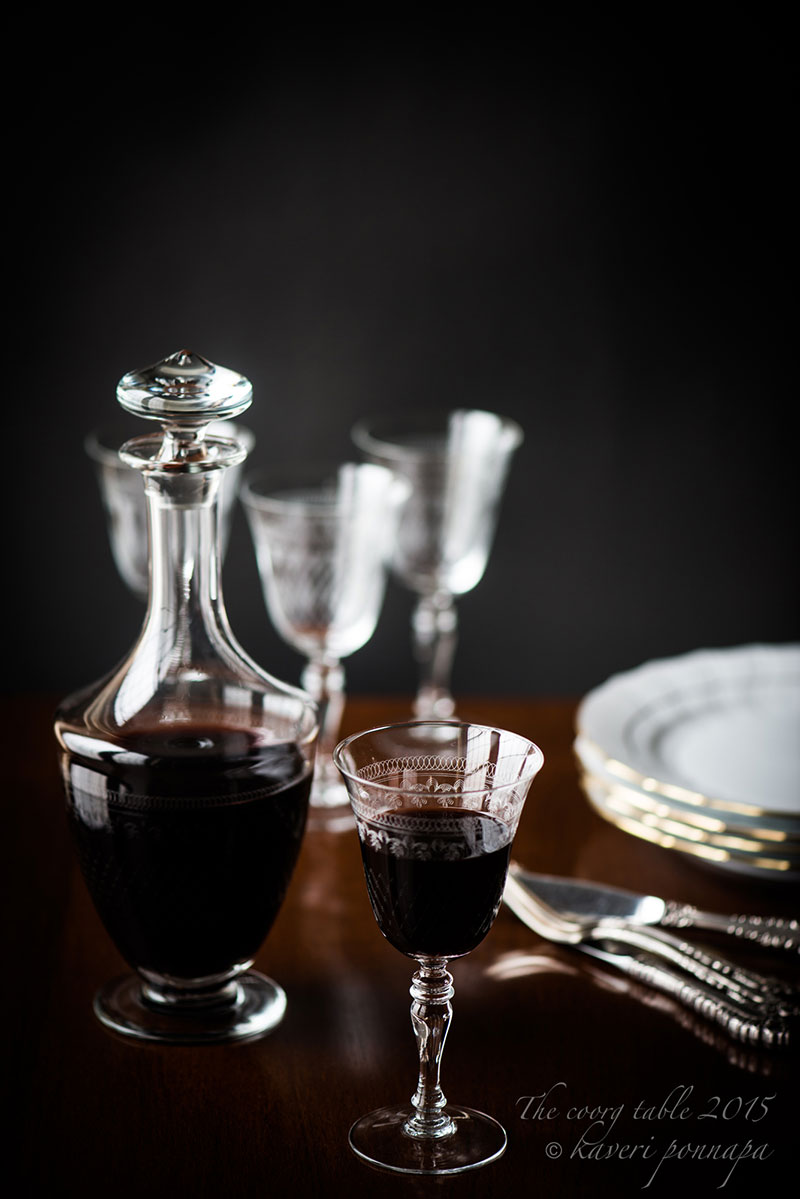 At her estate home, her menus were eclectic, a mix of typical Coorg dishes –noolputtu and chicken curry, akki ottis and wild mushroom curry, as well as various other dishes she had learned to make during her life in the Andamans and Dehra Dun. There was a vivid tomato soup that I still dream of, with a slightly smoky sweetness, served up in bowls edged with a bright orange and yellow pattern that offset the contents. Her kitchen philosophy appeared to be ‘less is plenty’. I can’t imagine how else she could have kept her table so well supplied in such a remote location. Of course there were some advantages of being a long way from anywhere, such as the basket loads of wild mushrooms that came our way, along with wild game. Someone in the house would shoot every other day and more often than not, return with a brace of birds. One of the staff at the door, with an offering of game bunched in one hand was a familiar sight.
At her estate home, her menus were eclectic, a mix of typical Coorg dishes –noolputtu and chicken curry, akki ottis and wild mushroom curry, as well as various other dishes she had learned to make during her life in the Andamans and Dehra Dun. There was a vivid tomato soup that I still dream of, with a slightly smoky sweetness, served up in bowls edged with a bright orange and yellow pattern that offset the contents. Her kitchen philosophy appeared to be ‘less is plenty’. I can’t imagine how else she could have kept her table so well supplied in such a remote location. Of course there were some advantages of being a long way from anywhere, such as the basket loads of wild mushrooms that came our way, along with wild game. Someone in the house would shoot every other day and more often than not, return with a brace of birds. One of the staff at the door, with an offering of game bunched in one hand was a familiar sight. 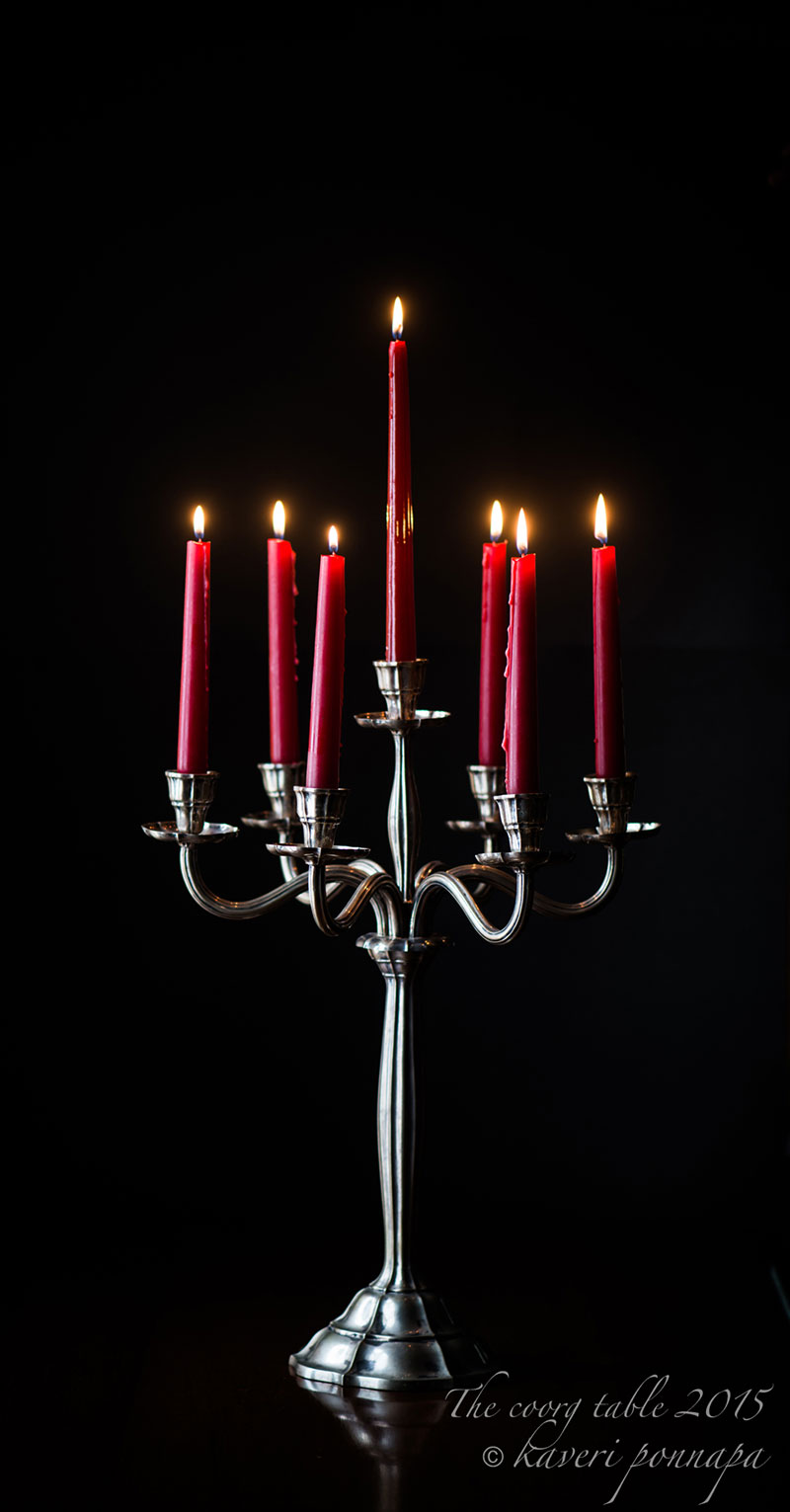 Of all the many feasts that I enjoyed over the holidays, I will always associate quail, partridge and green pigeon with that house. I loved the gamey taste of the birds, the flare of pepper and the familiar sourness of Coorg vinegar, kachampuli. Invariably, cutlery was abandoned, and fingers would pick the small, delicious birds clean.
Of all the many feasts that I enjoyed over the holidays, I will always associate quail, partridge and green pigeon with that house. I loved the gamey taste of the birds, the flare of pepper and the familiar sourness of Coorg vinegar, kachampuli. Invariably, cutlery was abandoned, and fingers would pick the small, delicious birds clean. 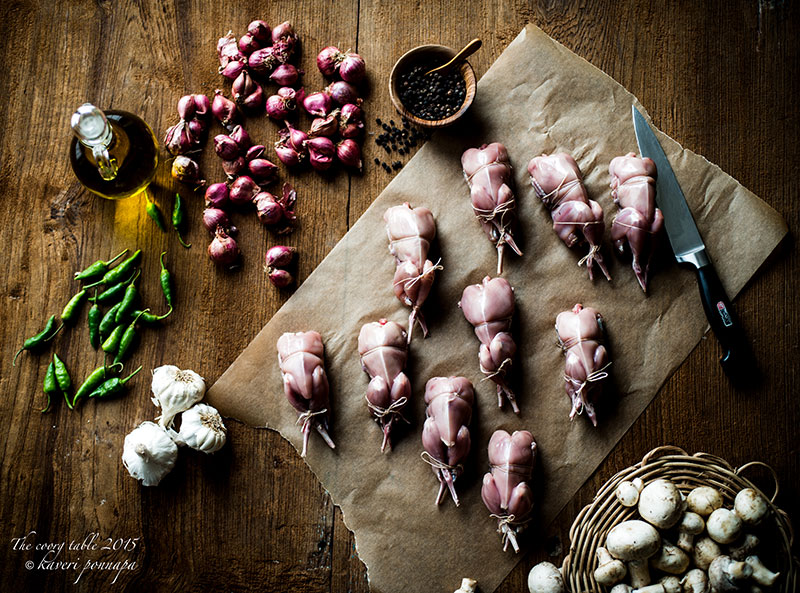 Shadows in the dining room were always the deepest, the dark paneling soaking up all the trembling light from the lamps. There was something timeless about quail and partridge cooked with familiar spices eaten at a table crowded with three tiers of generations. Somehow, it connected us all with the small village in Coorg from which grandfather set out into the world to make his life, and carried us in a wide arc to those faraway islands, enmeshed us in a series of extraordinary lives, and brought us right back to where we were, hoping, one day, for stories of our own. My grandparents managed to carry their limitless inspiration, creativity, energy and a particular sense of mystery everywhere they went –even deep into retirement.
Shadows in the dining room were always the deepest, the dark paneling soaking up all the trembling light from the lamps. There was something timeless about quail and partridge cooked with familiar spices eaten at a table crowded with three tiers of generations. Somehow, it connected us all with the small village in Coorg from which grandfather set out into the world to make his life, and carried us in a wide arc to those faraway islands, enmeshed us in a series of extraordinary lives, and brought us right back to where we were, hoping, one day, for stories of our own. My grandparents managed to carry their limitless inspiration, creativity, energy and a particular sense of mystery everywhere they went –even deep into retirement. 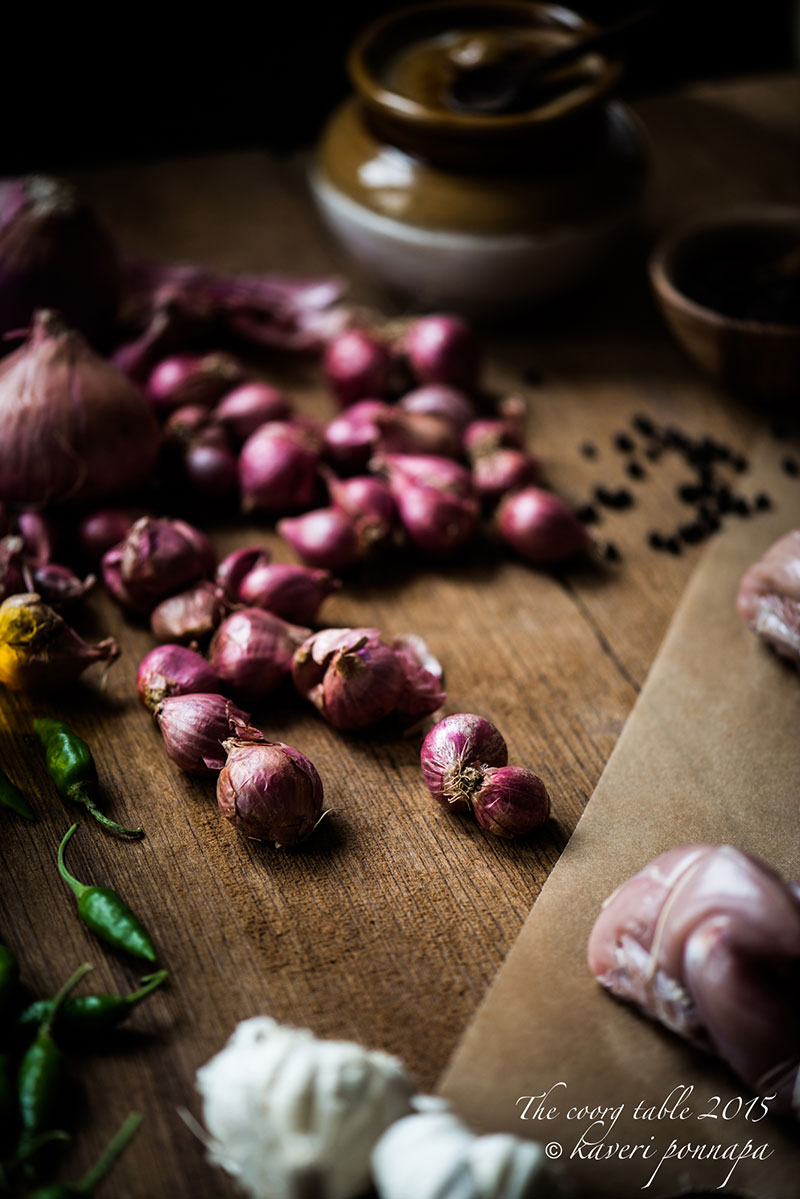
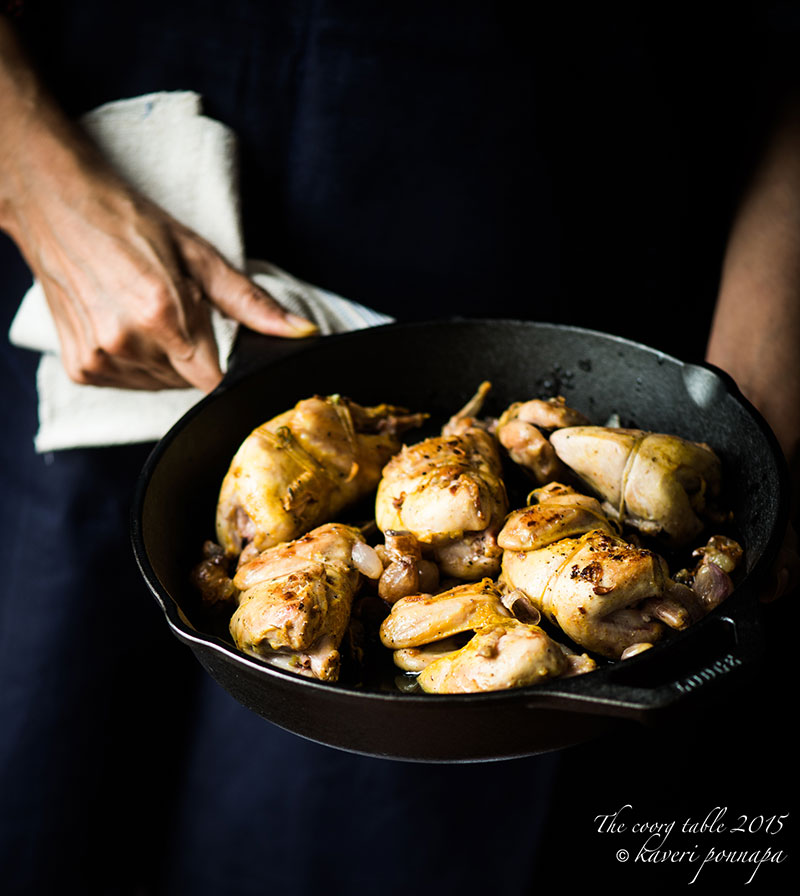
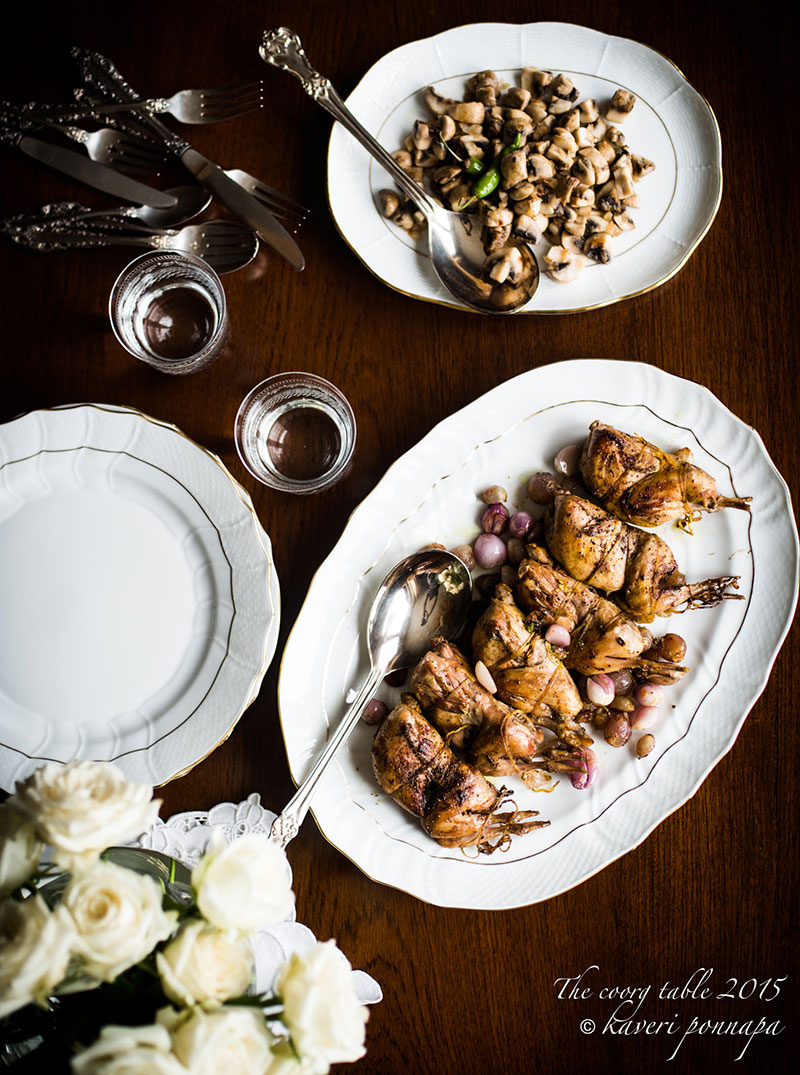
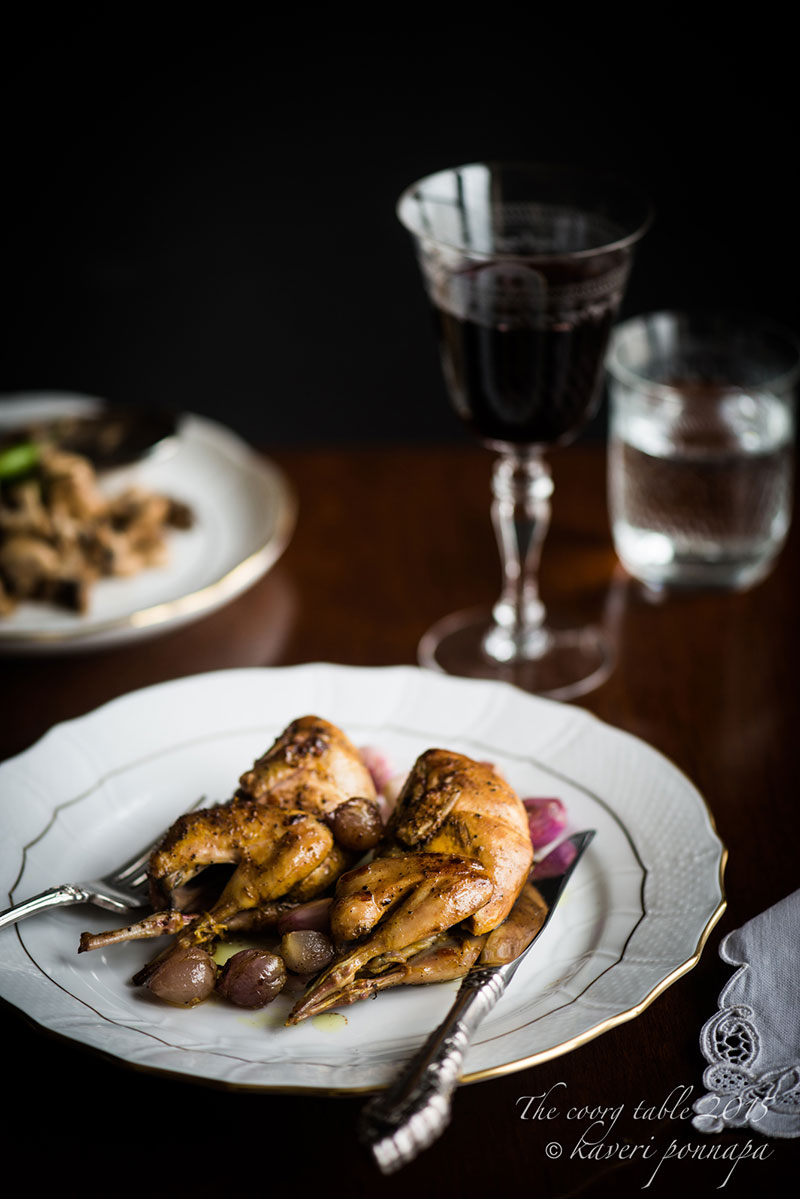
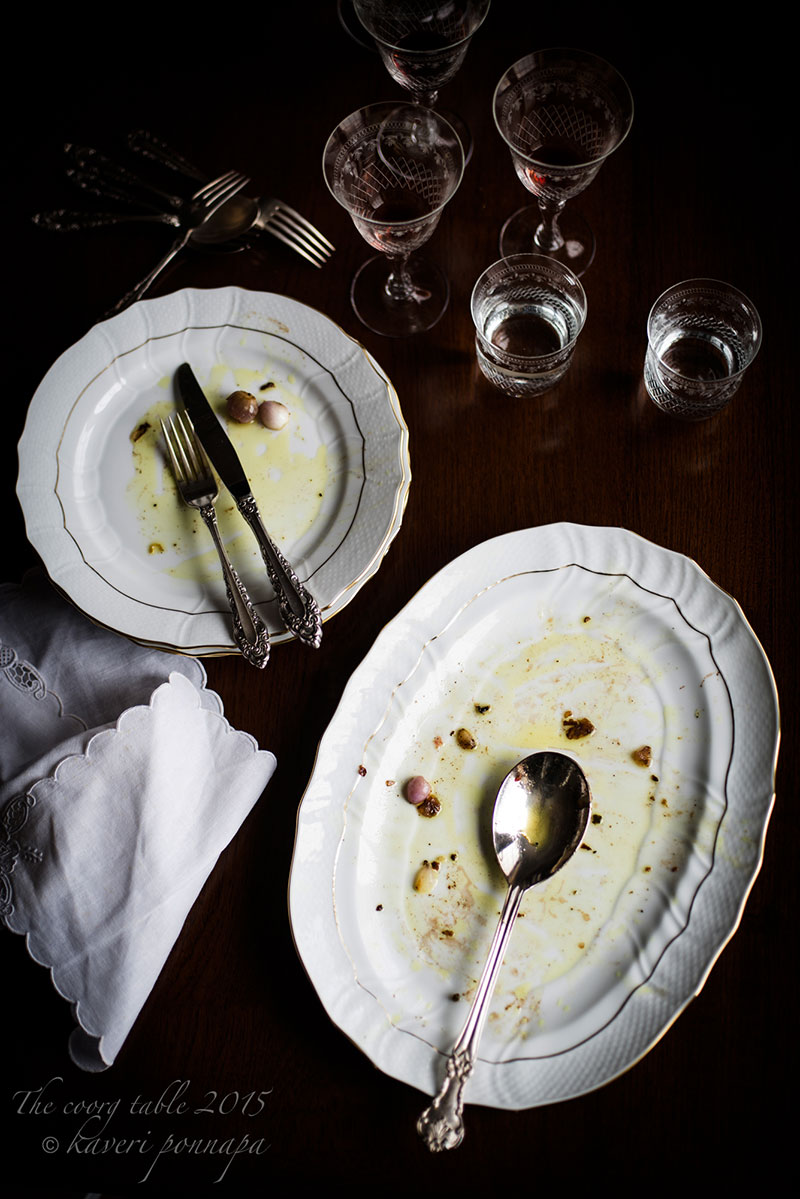
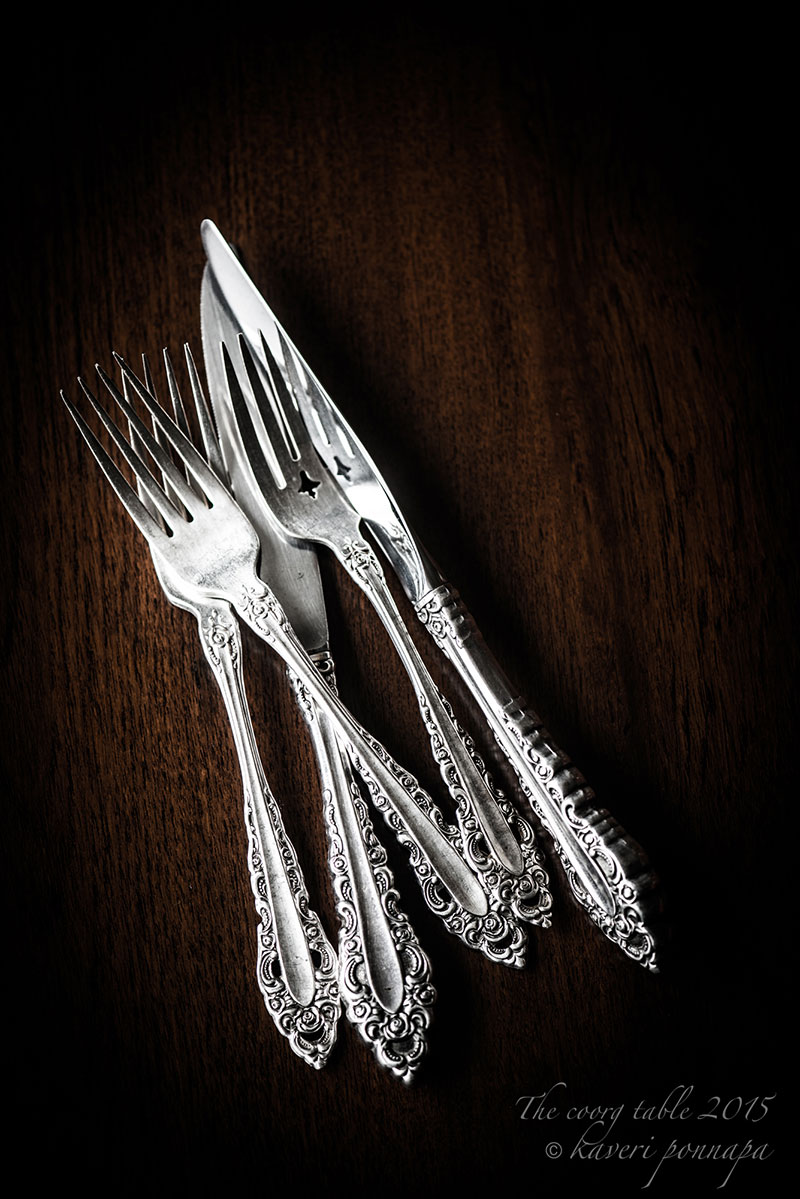
Image Credits: Nithin Sagi
All Food Styling: Kaveri Ponnapa
Thank you for visiting this page. If you read something that you enjoy, or see an image that you like, please take a moment to write a response. Do look out for the recipes of all the food featured here in my upcoming cookbook.

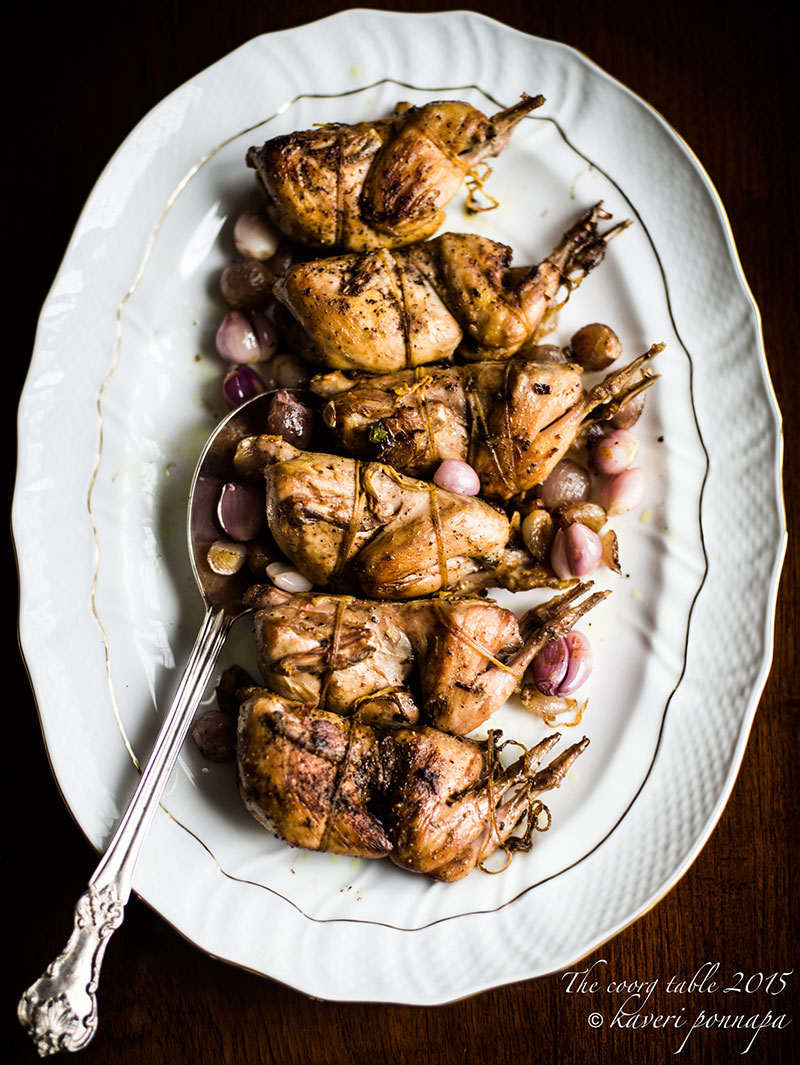
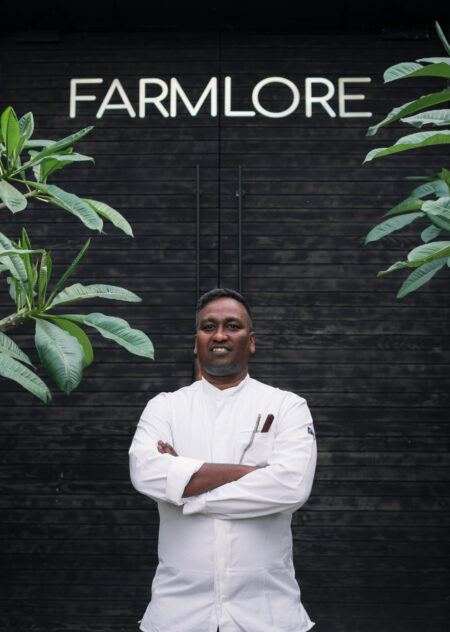
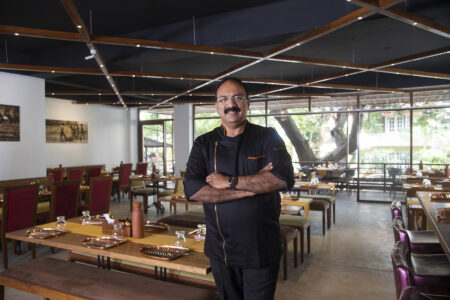
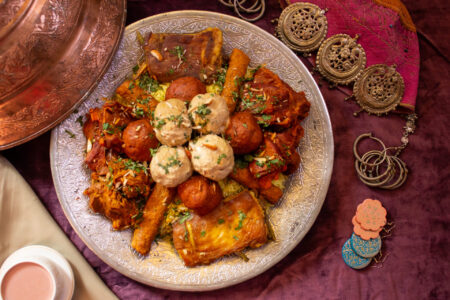
Excellent writing. Awesome stories.
Hi Phil, Thanks very much for reading. Glad you enjoyed this post. Regards. Kaveri
Hi, beautiful write up this is..but i find it a li’l too harsh to refer jarawas as “hostile jarawa tribesmen”, because I had been to andamans several times and encountered them very closely on a few rare occassions while crossing the forested islands. Just that they are more instinctive like animals anv no more hostile than us who call ourselves civilized. Raka.
Hello Raka, thank you for writing in, I’m glad you enjoyed the post. The reference to the Jarawas was not a judgement but just a statement of fact: at the time when my grandparents lived in the Andamans, the British Government was pushing hard into traditional Jarawa lands and taking control of the forests. Of course, the Jarawas did everything to protect their territory, and were totally justified in doing so. I am an anthropologist, and know for a fact from my own fieldwork and related reading that traditional societies have highly sophisticated views of the world and belief systems from which we could learn a great deal. Here’s a link I hope you enjoy reading: http://www.thevanishingkodavas.com/
Your narrative is vivid and recipes are captivating. I am a new food blogger ( here is my blog http://www.flavorofspice.com/) who has been writing for the past six months and your work is very inspirational. I will definitely try this dish, though the Pandi curry is something special. I have bookmarked your blog and will look forward to your posts!
Hello Prateek, thank you for visiting these pages, and for your kind comments. I’m so glad that you enjoy these posts, do keep reading and writing in. Pandi curry is indeed very special, but please try the fish and crab curries, they are stunning! Every time I cook the crab curry for friends and guests, they absolutely love it.Good luck with your blog,I look forward to reading more. Best. Kaveri
Kaveri, that was magical. Not for the first time, I’ve been seduced by your writing, which even overshadows the recipes — and those being marvellous, it takes a lot to do it!
Welcome back, Saras! Thank you, this was a special post -the memories and material were so rich, I just had to let them speak. xx
Is Mrs Chengappa the grandmother you’ve written about. I’ve met her a few times at her house in Bnagalore. Great person!
Yes, she is indeed! What a small world. Best wishes. Kaveri
Dear Radhika, We enjoyed your elegant article about your family life growing up. We have collected a rich library of your writings and relish each new addition. It is very special to be able to compare experiences half a globe apart.
I grew up in Connecticut, USA in a rural environment. Like your family, we were blessed with wild game of various sorts. My grandfather gave me my first fishing rod when I was very young, and I spent most days at a pond or stream. Much later when I was in business, I was introduced to bird hunting in Georgia and Texas. So today, depending upon the season, we have a refrigerator stocked with wild turkey, quail, pheasant and dove.
And like the Ponnapa family, we love to eat our bounty. Imagine the treat of fresh brook trout fried in real butter and eaten like corn on the cob! Or turkey breasts roasted on fresh spring peaches which later become part of the gravy.
It is a wonderful life, and we have been blessed with friends like you and Naresh. Warm regards, John
Welcome to The Coorg Table, John! I loved hearing about your experiences -I believe that growing up in this way, we learn to live very close to nature, and develop a deep respect for every single thing that it offers us, season after season.It is indeed a wonderful life. Thank you very much for your kind appreciation of my work, it always means a lot when it resonates with a reader. Warm regards. Radhika
I’ve just spent the entire morning reading your blog. You are a beautiful storyteller and it seems so effortless. I’ve recently started a blog myself, and yours is an inspiration. I hope I can meet you in person someday, but till then, I will keep visiting this space.
Welcome to The Coorg Table, Richa, and thank you very much for your kind words about these pages. Congratulations on your blog, you don’t mention what it is called, but I hope that you will enjoy writing it as much as I love writing mine. One of the nicest things is being able to connect with other bloggers, and I have met some wonderful people through their posts, so I hope we can meet someday. In the meanwhile, I look forward to hearing from you on these pages. Warm wishes.Kaveri.
So beautiful, so well written. Please write a book soon. Excellent photos!!
Hello Radhika, welcome to The Coorg Table, and thank you very much for your appreciation. I would love to write a book filled with stories, recipes and more for all the people like you who have enjoyed this blog, and supported me with so much encouragement – it’s work in progress,in a way, so let’s see what comes of it! Do keep visiting these pages, I would love to hear from you. Kaveri
Haunting and evocative, as always, Kaveri 🙂
Can’t wait to read more about your grandparents and their life in the Andamans. They sound like quite the couple.
Thank you very much, Anisha, so glad you enjoyed the post. Yes, it was an extraordinary life, and there are so many stories from that time, I’m sure that a few more will find their way onto this page. Do keep visiting, and let me know if you try out any of the recipes. Warm wishes. Kaveri.
Enjoyed reading this post and the details about your grandparents house. Totally mesmerizing..
Hi Preeti, thanks very much for visiting this page, and I’m so glad that you enjoyed reading the post. My grandparents really did create a beautiful and unusual life for themselves, and shared it with everyone around them. I hope that you will try some of the other recipes too, and let me know how they turned out. I look forward to seeing you more often on the blog. Warm wishes.Kaveri.
Radhika I could feel myself growing up in your grandparents house. Your writing really makes one feel like part of the story…… You are an unbelievable writer and human being. I am lucky to have met you.
Maria
Hello Maria, welcome to The Coorg Table! Thank you very, very much for your appreciation, and all the love in your message, I value your friendship enormously. So looking forward to seeing you soon, it’s been far to long. xoxo
enjoyed reading the whole article and the details about your grandparents house. totally mesmerizing..
Captivating read Kaveri!! The visual imagery jumps out from the article….am so very curious about your grandpa’s write up on his experiences in the Andamans. Are they accessible/available Or can be shared?
Awaiting your next blog post eagerly- loved this piece!!
Thank you very much, Seema, this was a special post in its own way, and it feels good to have been able to share it with people. Yes, my Grandfather, B.S.Chengappa’s paper is available online at the South Asia Archive website at this link: http://www.southasiaarchive.com/Content/sarf.120200/220506/003
Unfortunately it is not a free service, so I will try and find a way to share it. In the meanwhile, let me get busy on my next post-I do hope that you enjoy it as much as you did this one. Do try the recipes! Warm wishes.Kaveri.
very nice write up and recipe. I am going to try this soon.
Hello Julie, thanks for visiting The Coorg Table, I’m so glad you enjoyed reading the post, this one is filled with many memories. Do try the recipe, it’s very simple, and I’d love to hear how it turned out. Warm wishes. Kaveri.
Amazing writeup – I could close my eyes and imagine your grandparent’s wonderful house, Kaveri.
I agree about the importance of pepper as a flavor – it lends itself very well to quail and other small poultry. I am very generous in my pepper servings…..the resulting dish with an accompanying drink is very satisfying indeed.
Hello Ashwin, I am so glad that you enjoyed reading this post. I do hope you’ll try out the recipe before long, and enjoy it with a glass of ‘something special’! Warm wishes. Kaveri.
The way you narrated story made me felt that I am presently in the estate which you are speaking about, I lost myself deep in the forest….I do remember my Uncle’s, Aunt’s had good target they used to shoot the birds, Kaad Koli, Kaad Pandhi without missing their target…(Personally I don’t like shooting birds)…….On the other end I noticed while reading your blogs you always speak about your Grand Parents, Mother-In-Law which shows your respect towards them which make me more happy and make you so Special from other writers…You are doing such a great and lovely job..Keep continuing and be happy always……….Thanks for wonderful writing….
Hello Kaverappa, I always look forward to your responses to my posts, it’s wonderful when a reader takes the time to write in. Thank you very much for your kind words – food stirs up all sorts of memories,and brings back so many special moments, and I am often surprised at all that I can remember through the taste of a particular dish. This dish is made with farm-reared quail, as you know, and is a simple but delicious recipe. Warm wishes. Kaveri.